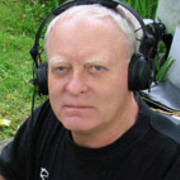
Mike Westgate
Mike Westgate sees working in sound as a job that requires being able to "see the whole picture" and work well as part of a team. Westgate's impressive career has seen him becoming a valuable crew member across shoots in 27 nations.
Growing up in East London, a family friend encouraged Mike Westgate's interest in electronics. In 1961 he began working in a lab that developed colour televisions, and five years later got a job as a boom operator on drama shows, for television company ATV. It was there he was first inspired to move into film, partly thanks to a young Kiwi crewmember called Martin Campbell (later to direct Bond hit Casino Royale).
Westgate boned up further in sound and associated technical matters during a three-year stint at the BBC. The gig was not a big earner, and Westgate was considering going freelance when he noticed a job notice that grabbed his eye: as chief technical officer to the Government of Malawi.
Within three months Westgate and family had decamped to Africa, where he commanded more than a dozen people, handling sound at everything from state banquets to political rallies. The stress was high; if there was a technical problem, some of Westgate's staff members were sometimes punished with jail-time.
In 1975 Westgate arrived in New Zealand to help set up matters sound-related at Vidcom, the country's first broadcast capable production house (and only the twelfth of its kind in the world.) Westgate found himself doing everything from sorting the sound engineering of the studio, to recording sound, selecting music, and mixing together the results.
Westgate established company Mike Westgate Sound Ltd in 1978. His first feature saw him and Brian Shennan mixing sound for David Blyth's off-beat Angel Mine. But Westgate's feature career really kicked off when Roger Donaldson asked him to record the sound for his classic Smash Palace (1981), the first of a number of productions they collaborated on.
The following decade saw Westgate working as a sound recordist or mixer on another 10 New Zealand features, including The Quiet Earth, Starlight Hotel, Death Warmed Up (the first Kiwi film made in Dolby Stereo) and Larry Parr's French shot A Soldier's Tale. He also contributed to many shorter projects, recording sound for tour doco Keskidee Aroha, anthology TV series About Face and sonically demanding Alison MacLean short Talkback.
In the 90s Westgate began to concentrate more on television projects, many of them Kiwi shoots for American series and 'movies of the week'. Among the long list are 80 episodes of Hercules - The Legendary Journeys, a series which netted him three nominations for dialogue recording from America's Motion Picture Sound Editors organization.
His documentary work includes a number of expeditions undertaken by Jean-Michel Cousteau. The 'Sharks at Risk' episode of series Jean-Michel Cousteau: Ocean Adventures saw Westgate amongst those nominated for sound awards at the 2007 News and Documentary Emmy Awards, and from America's Cinema Audio Society.
Westgate has continued to balance sound projects across the drama/doco spectrum, including working as sound mixer on Roger Donaldson hit The World's Fastest Indian, as a sound recordist on British doco series Victoria's Empire, and with a stint on the sound effects unit for The Last Samurai.
He is also a proud father, keen photographer, sometime painter and musician, and has done guest lectures at South Seas Film School (and occasionally Unitec) since the mid 1990s.
Sources include
Ande Schurr, 'How Feelancers Can Succeed: the Holistic Freelancer' (Interview) The Big Idea website. Loaded 25 January 2010. Accessed 10 June 2020